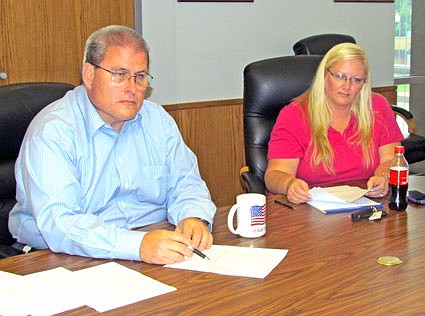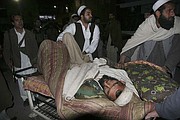When the Fulton Sun met with City Administrator Bill Johnson and the team involved in the fire union negotiating process Friday, Assistant Director of Administration Jerry Sorte said the city-wide debate about the appropriate salary for Fulton firefighters has shed light on a bigger issue in the city.
"Many city employees wish they could be paid more, and they feel discouraged because they can't be," Sorte said. "What we're faced with the city obviously is limited revenue. We can't pay what Columbia pays or what Jefferson City pays because our funding is limited, and I think that smaller, local governments have always been faced with that challenge."
He said the purpose of the city salary survey, a frequently cited document in the debate on increased firefighter wages, was to gather clear, comparable numbers and try to analyze salaries from a position-by-position basis.
"A city about the size of Fulton can't afford to just do very large, across-the-board pay raises," Sorte said. "We're gonna have to be strategic. We're gonna have to try to look at this with an issue of fairness I think with all city employees moving forward. When we go for the full implementation in January for the 2016 budget, we will be able to look at some of those longevity issues as we make salary adjustments."
Johnson explained that between the time the negotiations ceased and the city council took action, members of the fire union contacted various city council members. When he talked to those council members before before the (Aug. 11) council meeting, those members indicated to the union that 9 percent would not work.
"They (council members) said they could not vote for that," Johnson said. "And even then the (fire) union said, "Well, we're gonna go for 9 percent.'"
He said that individual council members told the union they were not going to support the increase, but the union insisted that it be pushed through.
Johnson thinks the fire union and firefighter supporters have framed the issue as something against him personally, and have taken his statements out of of context. He attributes the personal statements recently directed to him to his recommendation disapproving the contract.
"The fire union is trying to make this about me and my salary," Johnson said.
He gave the Fulton Sun a document that listed his yearly salary since 1997, and explained that a raise is determined "based on council recommendations when the mayor goes to the council."
"Anything with 19 years of compounded interest goes up," he said. "So the fact that someone's salary goes up over time is just what happens."
He added that the supporters who addressed the council from the podium during the public hearing Aug. 25 accused him of making several statements he never said. When asked to elaborate on his alleged statement, "Anyone could be a firefighter," Johnson denied making the statement, and the city negotiating team agreed they never heard him state it.
Instead of targeting him, Johnson believes firefighter supporters should consider the council members' perspective of the contract and why they adhered to his recommendation to voted against it.
Besides the 9 percent pay increase, Johnson cited several other items in the union's proposed updated Memorandum of Understanding (MOU) that the city would not support. He elaborated on the revisions, saying the union wanted to have more control over some of the city's management rights that apply to fire department work rules and policies. For example, he said the union wanted to be involved in the hiring process of future firefighters. There was also a "completely different" disciplinary policy several pages long that Johnson believes may entail more staff time, review time and investigation time to effectively enforce. One of the city's main issues with the contract that Johnson addressed in detail was the limited descriptions of the disciplinary section, specifically about the classifications pertaining to violations of the disciplinary system.
"There were no classifications ... If something was minor, if something was serious, who decides?" Human Resources Director Michelle Frazee said.
Johnson also offered his opinion on the proposed revisions to the disciplinary section in the contract.
"There was no definition of she slapped you, is that a big deal?" Johnson said. "On a scale of one to five, is that a minor, is that a mini, is that a major or serious (offense)? There was no definition. It was unenforceable. It was unmanageable. And right now we just start out and could go anywhere from a verbal warning to a termination based on anything you do. They wanted a very lengthy process of documentation and investigation."
Another troublesome revision for the city, according to Johnson, was the union's proposal to use accumulated sick time. Specifically, Johnson said union representatives wanted to change the way that leave requests could be made.
"And right now we run with a small department, so for them to be able to change their leave with just a couple of shifts notice, it would put the department at risk of being able to fill that slot without having to pay someone overtime."
The fire department's size raised concerns for Johnson regarding the union's proposal to add a leave of absence without pay up to 180 days to the contract.
"We can't support that," he stated. "Again, I'm back to we're a small department. If we know that we're gonna go possibly six months with you not coming to work, I'm going to need to hire somebody, or you not coming in is going to force us to go into an overtime situation just on an ongoing basis. Other employees don't have that ability to go on leave without pay."
Johnson said the fire department has one incredible benefit that every other employee may envy - firefighters are allowed to trade shifts.
"Just in the department by itself, there's an inherent, huge amount of shift flexibility that we allow," Johnson said. "They can trade shifts with anybody at any time."
He added that shift flexibility permits firefighters to have a day off for personal or family reasons without having to forfeit a vacation day.
Johnson admits the City of Fulton is a training ground for several departments. He acknowledged that multiple departments, including the fire department, have lost personnel to competing cities that pay better. A more substantial salary isn't a driving factor for all city employees, Johnson said. Underpaid city employees may choose to leave Fulton for better pay, yet they remain in town because of their commitment to their job and the community.
"Within three days of the city council voting down the contract, I signed off and approved another firefighter being hired at $8.65 an hour," Johnson said. "There are several applicants who are fine with making that much an hour otherwise they wouldn't be applying."
Johnson also addressed the notion that firefighters hold a dangerous job, but he said several other city professions also involve risk. He stated that according to national statistics on the two web sites he viewed, the most dangerous job in the Fulton belongs to the solid waste workers, who ranked number four on the list of the most dangerous professions.
"They get hurt and injured the most because they don't know what somebody has put in their trash container," Johnson said. "It could be hazardous material, it could be a chemical, it could be vapors ... Firefighters do not make the top 10."
Ultimately, Johnson does not want to reward the firefighters - one group of city employees - at the expense of 170 city employees "just because they attended one city council meeting."


